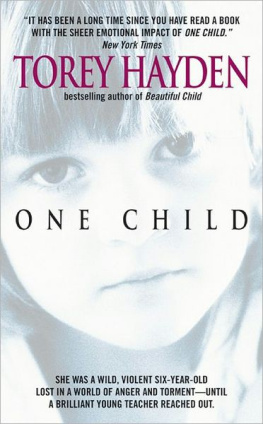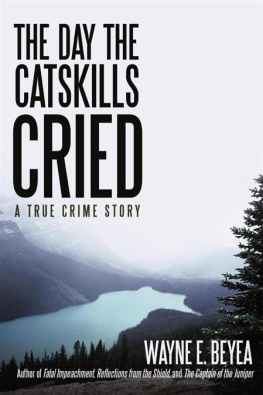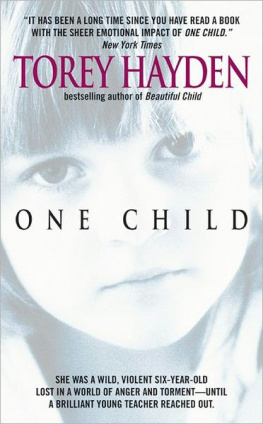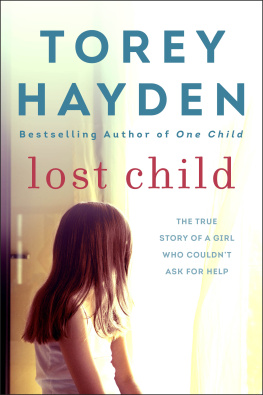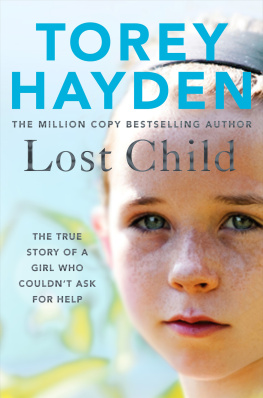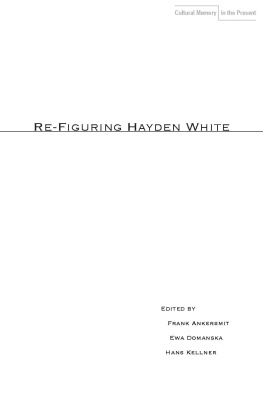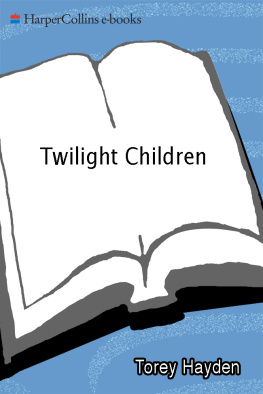One Child
by Torey L. Hayden
Nonfiction
Prologue.
FOR THE BETTER PART OF MY ADULT LIFE I have been working with emotionally disturbed children. The autumn of my freshman year in college I took a volunteer position in a day program for disturbed and disadvantaged preschoolers. From that season I have remained captivated by the perplexing aspects of mental illness in childhood. Since that time I have acquired three degrees; devoted several years as a teacher's aide, a teacher, a university instructor and a psychiatric researcher; lived in five states; and worked in private day-care centers, public schools, locked psychiatric wards and state institutions, all the while pursuing the elusive answers to these children, the magic keys that will finally open them to my understanding. Yet, within me, I have long known there are no keys, and that for some children, even love will never be enough. But belief in the human soul escapes all reason and flies beyond the frail fingers of our knowledge.
I am often asked about my work. Perhaps the commonest question is Isn't it frustrating? Isn't it frustrating, the college student asks, to live day to day with violence, poverty, drug and alcohol addiction, sexual and physical abuse, neglect and apathy? Isn't it frustrating, the regular classroom teacher asks, to work so hard for so little in return? Isn't it frustrating, they all ask, to know your greatest success will probably never have more than an approximation of normalcy; to know that these very little children have been sentenced to live a life which, by our standards, will never be productive, contributing, or normal? Isn't it frustrating?
No. No, it isn't really. They are simply children, frustrating at times as all children are. But they are also gratifyingly compassionate and hauntingly perceptive. Madness alone seems to allow the whole truth to be spoken.
But these children are more. They are courageous. While we turn on the evening news to hear of new excitements and conquests on some distant front, we miss the very real dramas that play themselves out among us. This is unfortunate, because there is bravery here unsurpassed by any outside event. Some of these children live with such haunted nightmares in their heads that every move is fraught with unknown terror. Some live with such violence and perversity that it cannot be captured in words. Some live without the dignity accorded animals. Some live without love. Some live without hope. Yet they endure. And for the most part they accept, not knowing any other way.
This book tells of only one child. It was not written to evoke pity. Nor was it intended to bring praise on one teacher. Nor to depress those who have found peace in not knowing. Instead, it is an answer to the question of frustration in working with the mentally ill. It is a song to the human soul, because this little girl is like all my children. Like all of us. She is a survivor.
CHAPTER 1.
I SHOULD HAVE KNOWN.
The article was a small one, just a few paragraphs stuck on page six under the comics. It told of a six-year-old girl who had abducted a neighborhood child. On that cold November evening, she had taken the three-year-old boy, tied him to a tree in a nearby woodlot and burned him. The boy was currently in a local hospital in critical condition. The girl had been taken into custody.
I read the article in the same casual manner that I read the rest of the newspaper and felt an offhand what-is-this-world-coming-to revulsion. Then later in the day it came back to me while I was washing the dishes. I wondered what the police had done with the girl. Could you put a six-year-old in jail? I had random Kafkaesque visions of the child knocking about in our old, drafty city jail. I thought about it only in a faceless, impersonal manner. But I should have known.
I should have known that no teacher would want a six-year-old with that background in his or her classroom. No parent would want a child like that attending school with his or her child. No one would want that kid loose.
I should have known she would end up in my program.
I taught what was affectionately referred to in our school district as the "garbage class." It was the last year before the effort to mainstream special children would begin; it was the last year to pigeonhole all the odd children into special classes. There were classes for the retarded, classes for the emotionally disturbed, classes for the physically handicapped, classes for the behaviorally disordered, classes for the learning disabled, and then there was my class. I had the eight who were left over, the eight who defied classification, I was the last stop before the institution. It was the class for young human refuse.
The spring before I had been teaching as a resource person, supplying help to emotionally disturbed and learning disabled children who attended regular classrooms part of the day. I had been in the district for some time in a variety of capacities; so I had not been surprised when Ed Somers, the Director of Special Education, had approached me in May and had asked if I would be interested in teaching the garbage class the next fall. He knew I had had experience with severely disturbed children and that I liked small children. And that I liked a challenge. He chuckled self-consciously after saying that, aware of how contrived the flattery sounded, but he was desperate enough to try it anyway.
I had said yes, but not without reservations. However, I longed for my own classroom again with my own set of kids. I also wanted to be free of an unintentionally oppressive principal. He was a good-hearted man, but we did not see things in the same way. He objected to my casual dress, to my disorderly classroom, and to my children addressing me by my first name. These were minor issues, but like all small things, they became the major sore spots. I knew that by doing Ed the favor of taking this class, allowances would be made for my jeans and my sloppiness and my familiarity with the kids. So I accepted the job, confident that I could overcome any of the obstacles it presented.
My confidence flagged considerably between the signing of the contract and the end of the first day of school. The first blow came when I learned I was to be placed back into the same school I had been in and under the same principal. Now not only did he have to worry about me but also about eight very peculiar children. Immediately we were all placed in a room in the annex which we shared with the gymnasium and nothing else. We were totally isolated from the rest of the school. My room would have been large enough if the children had been older and more self-contained. But for eight small children and two adults, plus ten desks, three tables, four bookcases and countless chairs that seemed to mate and multiply in the night, the room was hopelessly crowded. So out went the teacher's desk, two bookshelves, a file cabinet, all but nine little chairs and eventually all the student desks. Moreover, the room was long and narrow with only one window at the far end. It had originally been designed as a testing and counseling space, so it was wood-paneled and carpeted. I would have gladly traded all that grandeur for a room that did not need lights on all day or for a linoleum floor more impervious to spills and stains.
The state law required that I have a full-time aide because I was carrying the maximum load of severely disturbed children. I had been hoping for one of the two competent women I had worked with the year before, but no, I received a newly hired one. In our community, which had in close proximity a state hospital, a state prison and a huge migrant workers' camp, there was a staggering welfare list. Consequently, unskilled jobs were usually reserved for the unemployed listed with Social Services. Although I did not consider my aide position an unskilled one, Welfare did, and the first day of school I was confronted with a tall, gangly Mexican-American who spoke more Spanish than English. Anton was twenty-nine and had never graduated from high school. Well, no, he admitted, he had never worked with children. Well, no, he never especially wanted to. But you see, he explained, you had to take the job they gave you or you lost benefits. He dropped his gargantuan frame onto one of the kindergarten-sized chairs, mentioning that if this job worked out, it would be the first time he had ever stayed north all winter instead of following the other migrant workers back to California. So then we were two. Later, after the school year started, I acquired a fourteen-year-old junior high school student who devoted her two hours of study hall to coming over and working with my class each day. Thus armed, I met the children.
Next page
